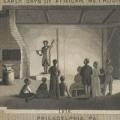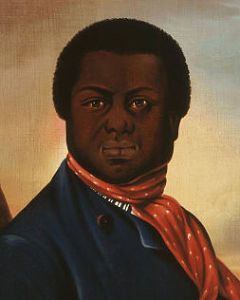41. Should I Stay or Should I Go? The Colonization Controversy
Questions of political autonomy and group identity in the emigration movement led by Paul Cuffe, Daniel Coker, John Russwurm and others.
Themes:
• R. Newman, P. Rael, and P. Lapsansky (eds), Pamphlets of Protest: An Anthology of Early African-American Protest Literature, 1790-1860 (New York: 2001).
• D. Porter, Early Negro Writing, 1760-1837 (Boston: 1971).
• R.C. Wiggins (ed.), Captain Paul Cuffe’s Logs and Letters, 1808-1817 (Washington DC: 1996).
• J. Winston, The Struggles of John Brown Russwurm: the Life and Writings of a Pan-Africanist Pioneer, 1799-1851 (New York: 2010).
***
• L.M. Alexander, African or American? Black Identity and Political Activism in New York City, 1784-1861 (Urbana: 2008).
• A.J. Beyan, African American Settlements in West Africa: John Brown Russwurm and the American Civilizing Efforts (New York: 2005).
• E. Burin, Slavery and the Peculiar Solution: A History of the American Colonization Society (Gainesville: 2005).
• J. Sidbury, Becoming African in America: Race and Nation in the Early Black Atlantic (Oxford: 2007).
• B.F. Stillion Southard, Peculiar Rhetoric: Slavery, Freedom, and the African Colonization Movement (Jackson: 2019).
• L.D. Thomas, Rise to Be a People: a Biography of Paul Cuffe (Urbana: 1986).
• R.R. Thomas, “Exodus and Colonization: Charting the Journey in the Journals of Daniel Coker, a Descendant of Africa,” African American Review 41 (2007), 507-19.
• A. Yarema, The American Colonization Society: An Avenue to Freedom? (Lanham: 2006).







Comments
Identity and the nature of Africana Philosophy
The last 2 minutes of this episode about the scope of this series:
"This may have seen to some a recent fabrication rather than something more organic or longstanding. Skeptics may see this as a manifestation of identity politics rather than reflecting a real historic tradition. However, it should be obvious by now that for diasporic africans has always been political and idea of africana [culture and philosophy] has been embraed by leaders for the past several centuries."
If anything, I'd argue this series has made me more skeptical of the concept of "African philosophy" as a unified tradition as a way that mirrors either the Indian series or the main series (my starting point was a weaker version of the way your initial episode of this series describes the assumed starting position of non-philosophers approaching the concept of Indian philosophy).
Seeing this as primarily an 'anthology' where items will overlap but the cross sections aren't systematically sitched together as opposed to a 'real' tradition" doesn't strike me as an idea that should get reduced down to people holding implicitly bad or good positions on so called "identity politics."
In reply to Identity and the nature of Africana Philosophy by Daniel
Unity
Hm, maybe what we said there wasn't clear enough since you seem to have missed the point. What we were trying to say is that you might think that it's only very recently that African Americans (and other people of African descent) have started looking back to precolonial Africa, especially ancient Egypt but also some of the other things we talked about, as being their history and as the beginning of a culturally and philosophically continuous, unified phenomenon with which they identify. To be honest I myself would have thought of this as something that emerged in the 1960s, before I worked on these podcasts. But in fact, our look at these early diasporic texts shows that this has been going on literally since the time of the American Revolution (the ideas put forward in the context of Masonry are a particularly good example). So the point was just that thinkers of the diaspora themselves have been asserting the unity of Africana philosophy since pretty much day 1, and in fact that assertion was bound up with the emerging notion of being "African" at all as we discussed for instance in the interview with Prof Sidbury. And I think that does mean it makes sense to put together episodes about the earlier written and oral traditions with the diasporic traditions, because the latter were explicitly referring all the time to the former. Does that help or at least explain the point more clearly?
Add new comment